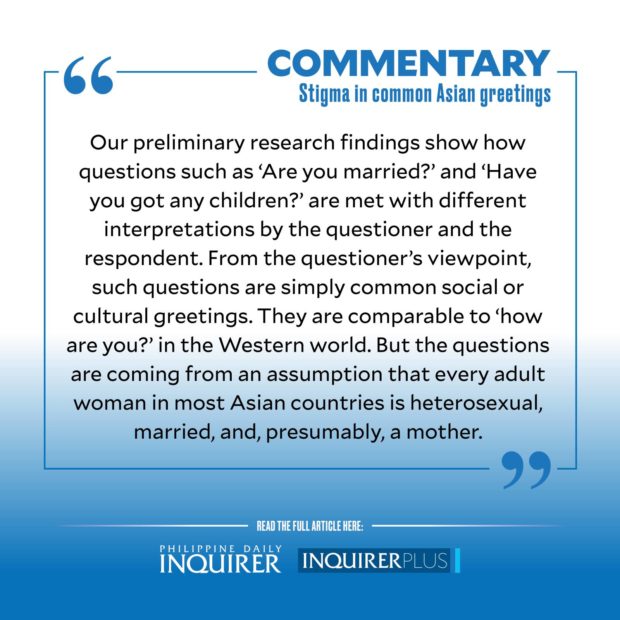Stigma in common Asian greetings
 Tina (not her real name), in her early 40s, is an accomplished woman from a Southeast Asian country, with a postgraduate degree under her belt. Being far away from home for many years, Tina has found that local Southeast Asian communities in her adopted country of Aotearoa New Zealand form her new family. However, interacting with them means that she has to cope with intrusive questions like “are you married?” or “do you have any children?”
Tina (not her real name), in her early 40s, is an accomplished woman from a Southeast Asian country, with a postgraduate degree under her belt. Being far away from home for many years, Tina has found that local Southeast Asian communities in her adopted country of Aotearoa New Zealand form her new family. However, interacting with them means that she has to cope with intrusive questions like “are you married?” or “do you have any children?”
In many Asian communities, questions on marital status and descendants are culturally acceptable. Partly, it’s due to the collectivist cultures, so it’s a “normal” question to ask friends, colleagues, or even strangers. But for Tina, who has been living in Aotearoa New Zealand for several years, the questions make her uncomfortable. For Tina, what has been perceived as a “normal” social greeting among Asian communities is felt as a stigma against unmarried and childless women.
Tina is not alone in feeling this way. Our current research project unpacks how questions about children can carry stigma. We found these questions impact self-esteem and women’s connections to their families and communities.
Article continues after this advertisementFocusing our research on Southeast Asian and South Asian women and couples, we interviewed 23 women—including the woman we’ve called Tina—who migrated from their birth country to Aotearoa New Zealand. These respondents have been through fertility issues and involuntary childlessness. Our preliminary research findings show how questions such as “Are you married?” and “Have you got any children?” are met with different interpretations by the questioner and the respondent. From the questioner’s viewpoint, such questions are simply common social or cultural greetings. They are comparable to “how are you?” in the Western world. But the questions are coming from an assumption that every adult woman in most Asian countries is heterosexual, married, and, presumably, a mother.
Assuming that everyone follows a similar cultural path, they ask these questions as part of their social understanding. Our participants understood that the questions are not necessarily coming from a bad place, and they should be understood as “social conventions” or part of the “daily greetings.”
For our study, we looked at the stigma associated with a “harmless,” “innocent,” and culturally common question, “have you got a child?”—both in the women’s birth countries and in Aotearoa New Zealand. While the question may seem harmless, our participants found it quite the opposite. They said the question felt like it devalued their being and positioned them as a tainted and discounted individual, due to their involuntary childlessness.
Article continues after this advertisementThis question has given the participants space to revisit their identity as a woman, Indonesian, Malay, Indian, Sri Lankan, or Asian—but not in a favorable way.
We also learn that there are several social consequences and impacts from the question about children. First, this stigma has caused social withdrawal and social exclusion among several of these women, both from the ethnic communities in Aotearoa New Zealand and from their relatives in their birth countries. We found that our female respondents received more questions and shared more shame and blame about their childlessness than their husbands. They were stigmatized both in their ethnic communities in Aotearoa New Zealand and in their home countries, by their extended family members, such as uncles, aunties, even nephews, and also acquaintances. These have caused them to withdraw from the social ethnic gatherings in Aotearoa New Zealand. Subsequently, they tried to distance themselves from connecting to their family back in their home country by, for example, calling family less often, so they didn’t need to answer the same old questions. Other couples tend to shorten their vacation time—such as cutting a one-month holiday to two weeks—to protect themselves from social and public scrutiny.
Our respondents reported that the stigma not only devalued, rejected, and excluded them from their social groups, but also positioned them as “less perfect” women. Thus, social exclusion and withdrawal were often the defense mechanism to protect themselves from their “own” people’s scrutiny and judgment. After being psychologically and physically exhausted from all the fertility treatments, protecting themselves from social judgment was the least they can do for their emotional health and well-being. It’s time to rethink if the questions we ask and treat as “part of our Asian-ness” are really so harmless. The Jakarta Post/Asia News Network
Nelly Martin-Anatias is lecturer of academic English at Massey University College, Massey University. Sharyn Graham Davies is associate professor of social sciences, Monash University. This article is republished from The Conversation under a Creative Commons license.
The Philippine Daily Inquirer is a member of the Asia News Network, an alliance of 22 media titles in the region.
















